Lose Weight
![]() Calories in Food
Calories in Food
![]() Calories in Fish
Calories in Fish
![]() Calories in Mackerel
Calories in Mackerel
Calories in Mackerel Fish, Nutrition Facts and Benefits
How many calories in Mackerel fish? See below, the Mackerel calories for the different serving sizes. We provide you with Mackerel nutrition facts and the health benefits of Mackerel to help you lose weight and eat a healthy diet.
Mackerel is a very oily, strong tasting fish. Compared to other fish it is quite high in fat, approx. 18g per 100g of which 4g is saturated fat.
However, it is bursting with vitamins and minerals. A 3.5 ounce or 100g portion provides more than three times the recommended daily intake (RDI) of vitamin B12. It is also a fantastic source of vitamins A, B1-B3, B5, B6, iron, magnesium, phosphorus, potassium, zinc, copper, selenium as well as other vitamins and minerals. It is also full of protein.
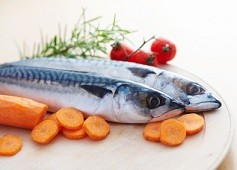
Mackerel contains both omega-3 and omega-6 fatty acids and is therefore thought to be very good for the health of our heart. Other Mackerel benefits are believed to include lowering our bad cholesterol levels (LDL) and lowering blood pressure.
Compare calories in Mackerel with the other calories in fish.
King Mackerel
Pacific Mackerel
Spanish Mackerel
Mackerel Nutrition
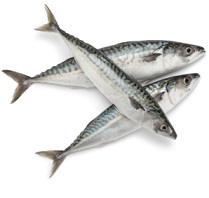
Mackerel, Atlantic, Raw
Refuse: 0%Scientific Name: Scomber scombrus L.
| Serving Size | Calories per Serving |
| 100 grams | 205 kcal (858 kJ) |
| 1 fillet, 112 grams | 230 kcal (961 kJ) |
| 3 oz, 85 grams | 174 kcal (729 kJ) |
Calories in Mackerel, Atlantic, Cooked, Dry Heat
Refuse: 0%| Serving Size | Calories per Serving |
| 100 grams | 262 kcal (1096 kJ) |
| 1 fillet, 88 grams | 231 kcal (964 kJ) |
| 3 oz, 85 grams | 223 kcal (932 kJ) |
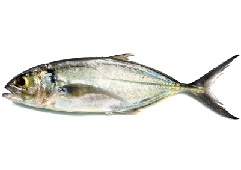
Mackerel, King, Raw
Refuse: 0%Scientific Name: Scombermorus cavalla (Cuvier)
| Serving Size | Calories per Serving |
| 100 grams | 105 kcal (439 kJ) |
| 0.5 fillet, 198 grams | 208 kcal (869 kJ) |
| 3 oz, 85 grams | 89 kcal (373 kJ) |
Calories in Mackerel, King, Cooked, Dry Heat
Refuse: 0%| Serving Size | Calories per Serving |
| 100 grams | 134 kcal (561 kJ) |
| 0.5 fillet, 154 grams | 206 kcal (864 kJ) |
| 3 oz, 85 grams | 114 kcal (477 kJ) |
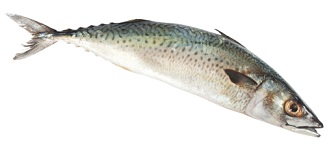
Mackerel, Pacific and Jack, Mixed Species, Raw
Refuse: 0%Scientific Name: Scomber spp. and Trachurus spp.
| Serving Size | Calories per Serving |
| 100 grams | 158 kcal (661 kJ) |
| 1 fillet, 225 grams | 356 kcal (1487 kJ) |
| 3 oz, 85 grams | 134 kcal (562 kJ) |
Calories in Mackerel, Pacific and Jack, Mixed Species, Cooked, Dry Heat
Refuse: 0%| Serving Size | Calories per Serving |
| 100 grams | 201 kcal (841 kJ) |
| 1 oz, boneless, 28.35 grams | 57 kcal (238 kJ) |
| 1 cubic inch, boneless, 17 grams | 34 kcal (143 kJ) |
| 1 fillet, 176 grams | 354 kcal (1480 kJ) |
| 3 oz, 85 grams | 171 kcal (715 kJ) |
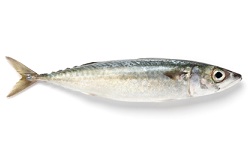
Mackerel, Spanish, Raw
Refuse: 0%Scientific Name: Scombermorus maculatus (Mitchill)
| Serving Size | Calories per Serving |
| 100 grams | 139 kcal (582 kJ) |
| 1 fillet, 187 grams | 260 kcal (1088 kJ) |
| 3 oz, 85 grams | 118 kcal (495 kJ) |
Calories in Mackerel, Spanish, Cooked, Dry Heat
Refuse: 0%| Serving Size | Calories per Serving |
| 100 grams | 158 kcal (661 kJ) |
| 1 fillet, 146 grams | 231 kcal (965 kJ) |
| 3 oz, 85 grams | 134 kcal (562 kJ) |
Mackerel Nutrition Facts
| Nutritional value per 100 g (3.5 oz) | ||||
|---|---|---|---|---|
| Proximates: | ||||
| Nutrients | Mackerel, Atlantic, cooked, dry heat | Mackerel, Pacific and jack, mixed species, cooked, dry heat | Mackerel, Spanish, cooked, dry heat | Mackerel, King, cooked, |
| Water | 53.27 g | 61.73 g | 68.46 g | 69.04 g |
| Energy | 1096 kJ (262 kcal) | 841 kJ (201 kcal) | 661 kJ (158 kcal) | 561 kJ (134 kcal) |
| Protein | 23.85 g | 25.73 g | 23.59 g | 26.00 g |
| Carbohydrates | 0.00 g | 0.00 g | 0.00 g | 0.00 g |
| Fiber | 0.00 g | 0.00 g | 0.00 g | 0.00 |
| Total Fat: | 17.81 g | 10.12 g | 6.32 g | 2.56 g |
| saturated fat | 4.176 g | 2.881 g | 1.801 g | 0.465 g |
| monounsaturated fat | 7.006 g | 3.371 g | 2.139 g | 0.979 g |
| polyunsaturated fat | 4.300 g | 2.488 g | 1.805 g | 0.589 g |
| Cholesterol | 75 mg | 60 mg | 73 mg | 68 mg |
| Minerals: | ||||
| Calcium, Ca | 15 mg (1.5 %) | 29 mg (3%) | 13 mg (1.3%) | 40 mg (4%) |
| Iron, Fe | 1.57 mg (9 %) | 1.49 mg (8%) | 0.74 mg (4%) | 2.28 mg (13%) |
| Magnesium, Mg | 97 mg (24 %) | 36 mg (9%) | 38 mg (10%) | 41 mg (10%) |
| Phosphorus, P | 278 mg (28 %) | 160 mg (16%) | 271 mg (27%) | 318 mg (32%) |
| Potassium, K | 401 mg (9 %)521 mg (11%) | 554 mg (12%) | 554 mg (12%) | 558 mg (12%) |
| Zinc, Zn | 0.94 mg (6 %) | 0.86 mg (6%) | 0.62 mg (4%) | 0.72 mg (5%) |
| Copper, Cu | 0.094 mg (5 %) | 0.119 mg (6%) | 0.065 mg (3%) | 0.033 mg (2%) |
| Manganese, Mn | 0.020 mg (1 %) | 0.019 mg (1%) | 0.012 mg (0.6%) | 0.006 mg (0.3%) |
| Selenium, Se | 51.6 mcg (74 %) | 46.8 mcg (67%) | 40.6 mcg (58%) | 46.8 mcg (67%) |
| Vitamins: | ||||
| Vitamin C | 0.4 mg (0.7 %) | 2.1 mg (4%) | 1.6 mg (3%) | 1.6 mg (3%) |
| Thiamine (Vit. B1) | 0.159 mg (11 %) | 0.135 mg (9%) | 0.130 mg (9%) | 0.115 mg (8%) |
| Riboflavin (Vit. B2) | 0.412 mg (24 %) | 0.540 mg (32%) | 0.210 mg (12%) | 0.580 mg (34%) |
| Niacin (Vit. B3) | 6.850 mg (34 %) | 10.667 mg (53%) | 5.00 mg (25%) | 10.462 mg (52%) |
| Pantothenic acid (B5) | 0.990 mg (10 %) | 0.381 mg (4%) | 0.870 mg (9%) | 0.968 mg (10%) |
| Vitamin B6 | 0.460 mg (23 %) | 0.381 mg (19%) | 0.460 mg (23%) | 0.510 mg (26%) |
| Folate (Vit. B9) | 2 mcg (0.5 %) | 2 mcg (0.5%) | 1 mcg (0.3%) | 9 mcg (2%) |
| Vitamin B12 | 19.00 mcg (316 %) | 4.23 mcg (71%) | 7.00 mcg (116%) | 18.00 mcg (300%) |
| Vitamin A | 180 IU (4 %) | 77 IU (1.54%) | 109 IU (2%) | 839 IU (17%) |
| Vitamin E | - | 1.25 mg (6%) | - | - |
| Vitamin D | - | 457 IU (114%) | - | - |
| Vitamin K | - | 0.1 mcg (0.1%) | - | - |
| Percentages are relative to US Recommended Daily Intake (RDI) for adults. | ||||
Author: Lana Soko
Like This Page?
|
Share This Page:
|



